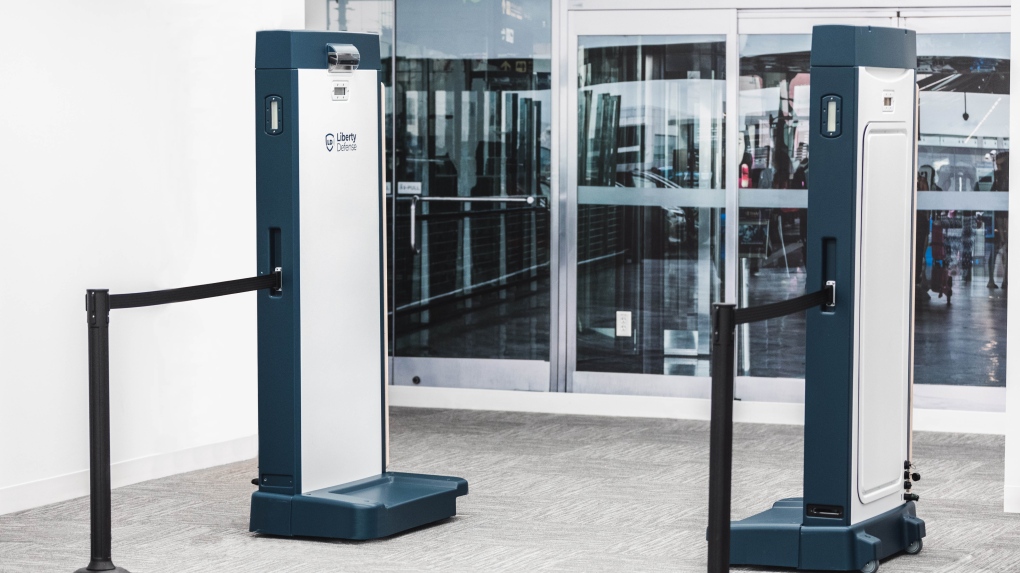Toronto Pearson Airport tested a new security portal. This is how it works
 A HEXWAVE security portal is seen in this undated photograph provided by Liberty Defense.
A HEXWAVE security portal is seen in this undated photograph provided by Liberty Defense.
Toronto Pearson International Airport says their new security portal has eliminated the need for travellers to remove items from their pockets.
“We are very pleased with the results of our beta testing trials to date, having screened approximately 8,000 people in total, and we anticipate reaching 10,000 screens as we plan to deploy at other beta sites,” President and CTO of Liberty Defense, Michael Lanzaro, said in a corporate update Tuesday.
Over the last two weeks, Pearson has been testing a new walk-through security scanner. Liberty Defense, the security company behind it, aims to identify concealed weapons through its technology.
This new security portal uses HEXWAVE technology, which involves 3D radar imaging and low-frequency radio signals to detect and identify both metallic and non-metallic items.
“What HEXWAVE does is it provides us with that added layer of security screening, without impeding the movement of travellers coming into the airport, without slowing down [the] public, it allows passengers to keep their benign items on their person without having to divest,” Jeffrey Barrow, associate director of safety and security at the Greater Toronto Airports Authority, said in the video.
The new technology allows travellers to keep items in their pockets and avoids the removal of clothes, unlike the traditional security scanner. According to the update, HEXWAVE successfully identified metallic and non-metallic threats as people walked through, including concealed un-assembled gun parts.
Bill Frain, CEO of Liberty Defense, previously told CTV News Toronto in February the system can spot the difference between everyday personal items, like a cell phone or wallet, and a threatening object, like a gun, pipe bomb or knife.
“What we do is we’re able to detect any type of threat,” he said. “We’re really looking at any type of anomaly that shouldn’t be on the body.”
Liberty Defense confirmed testing will continue until the end of 2022 and into the new year.
With files from CTV News Toronto’s Katherine DeClerq
CTVNews.ca Top Stories

How quietly promised law changes in the 2024 federal budget could impact your day-to-day life
The 2024 federal budget released last week includes numerous big spending promises that have garnered headlines. But, tucked into the 416-page document are also series of smaller items, such as promising to amend the law regarding infant formula and to force banks to label government rebates, that you may have missed.
Which foods have the most plastics? You may be surprised
'How much plastic will you have for dinner, sir? And you, ma'am?' While that may seem like a line from a satirical skit on Saturday Night Live, research is showing it's much too close to reality.
opinion I've been a criminal attorney for decades. Here's what I think about the case against Trump
Joey Jackson, a criminal defence attorney and a legal analyst for CNN, outlines what he thinks about the criminal case against Donald Trump in the 'hush money trial.'
$3.8M home in B.C.'s Okanagan has steel shell for extra wildfire protection
A home in B.C.'s Okanagan that features a weathering steel shell designed to provide some protection against wildfires has been listed for sale at $3.8 million.
Diver pinned under water by an alligator figured he had choice. Lose his arm or lose his life
An alligator attacked a diver on April 15 as he surfaced from his dive, nearly out of air. His tank emptied with the gator's jaws crushing the arm he put up in defence.
Psychologist becomes first person in Peru to die by euthanasia after fighting in court for years
A Peruvian psychologist who suffered from an incurable disease that weakened her muscles and had her confined to her bed for several years, died by euthanasia, her lawyer said Monday, becoming the first person in the country to obtain the right to die with medical assistance.
Mystery surrounds giant custom Canucks jerseys worn by Lions Gate Bridge statues
The giant stone statues guarding the Lions Gate Bridge have been dressed in custom Vancouver Canucks jerseys as the NHL playoffs get underway.
Celebrity designer sentenced to 18 months in prison for smuggling crocodile handbags
A leading fashion designer whose accessories were used by celebrities from Britney Spears to the cast of the 'Sex and the City' TV series was sentenced Monday to 18 months in prison after pleading guilty in Miami federal court on charges of smuggling crocodile handbags from her native Colombia.
Wildfire leads to evacuation order issued for northeast Alberta community
An evacuation order was issued on Monday afternoon for homes in the area of Cold Lake First Nation.
































